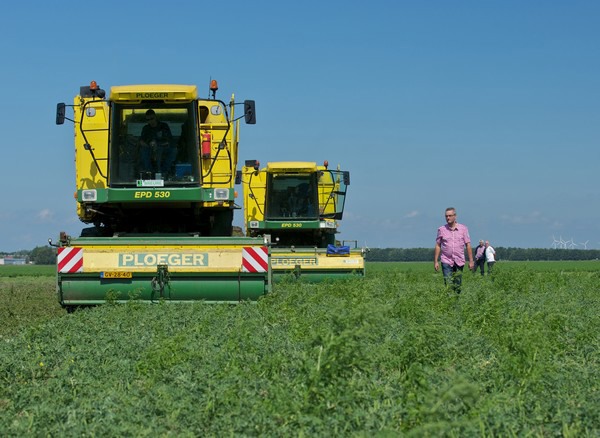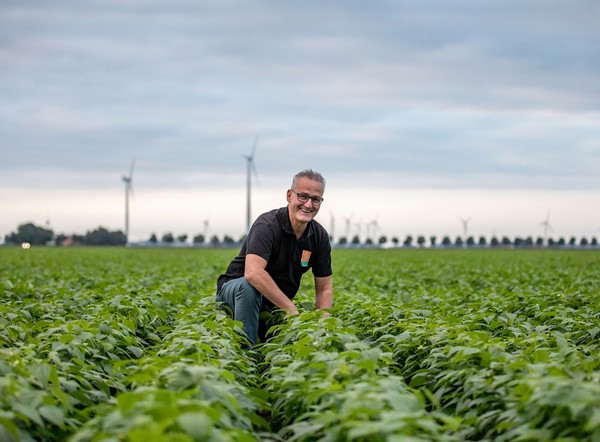"Things are ever dynamic and tumultuous, and no different for organic than conventional. The organic sector keeps gradually growing. Sometimes demand's too high; sometimes, there's a temporary shortage or a conversion boom, and then demand must grow alongside that. That has its own dynamics," begins Jan Groen, founder, and owner of Green Organics, referring to the effect current economic dynamics is having on the organic sector. This Dutch company grows, processes, and sells over 50 million kilos of organic fruit and vegetables annually.
Inflation, however, affects the two categories differently. "Prices are increasing much faster for conventional than organic products, which I consider beneficial. The prices paid for conventional products have always been less than what they cost to produce. Taxpayers fit that hidden bill, for example, in the €25 billion of buy-out costs for (livestock) farmers. We end up paying that hidden surcharge."

Odds are in organic's favor
Jan says that is making things interesting for the organic sector and that these sales keep increasing steadily, despite the various crises. "I think we're getting to the point where conventional is going to be more expensive than organic. The organic message is crystal-clear: how we're treating the earth by using chemical pesticides and fertilizers can't continue any longer. That's going to eventually bring the world to an end. So, the odds are in organic products' favor," he says. Jan cites organic milk as an example: organic and conventional milk are priced almost the same. "That difference has shrunk considerably. Conventional milk has rapidly become more expensive; it used to be half the price of organic. The same is happening in some vegetables."
Nonetheless, only four percent of Dutch cultivation is done organically, and organic food holds only three percent of the market share. "That has everything to do with attention; if you don't give something attention, it doesn't develop," he explains. Groen, thus, welcomes the recently announced Organic Action Plan, in which the government wants 15% of agricultural land to be used for organic farming by 2030.
Sustainability
"There will always be a market for organics, and if we want to sustain the world, that must expand substantially," he notes, adding that supply-wise, there may be many growers who are quite willing to convert, provided there are sufficient sales prospects. From a purely economic perspective, that would lead to an imbalance in supply and demand. That is why Jan advocates looking at this development differently.
"There should be much more focus on the story's ecological and healthy side." Here, Jan thinks the Netherlands lacks a 'true' culinary culture. "In the Netherlands, the primary human need, food, must be cheap; everything else can be expensive. If we don't raise awareness together and opt for sustainability, we'll keep fighting a losing battle. There's plenty of work still to be done in this regard," he reckons.
Jan believes the government has taken its first tentative responsibility with the Organic Action Plan and has provided an initial impetus. Still, he says, other links in the chain - trade, processing, retail, research, NGOs - must do the same. "All parties must cooperate to make the organic development a success. However, that must be done collaboratively, not by endlessly trying to outdo each other, but by working on creating successful chains."

Chain alliances
Groen sees a role for retailers in that process. "We have to flesh out questions like how do we get retail so involved products are brought to consumers in the right way? And how do we convince shoppers to buy? It's no longer responsible to keep promoting unsustainable products. Research shows that around 70% of what stores sell is unsustainable. If the retail sector doesn't take steps, government legislation and regulations will follow," he explains
Jan notices the importance of chain alliances in his business too. "We control the product chains from seed purchase to finished product to achieve a good earnings model for all the chain's links." He considers it a challenge for organic cultivation not to go through the same development as conventional cultivation with too much focus on intensification and economics. "Not getting as much as possible out of a producing unit and marketing that as broadly as possible. But also seeking the right balance in a healthy ecology, which means a broad earning model on a farm focused on local cultivation. We must first see that all of the Netherlands starts eating organic. There will always be a home market, which is a little easier to approach," Jan continues.
Sold ahead of time
He applies that broad earning model to Green Organics too. Jan focuses on the fresh, industry, canning, and frozen sectors. The company thus ensures there are sales outlets for all its products. "We pre-sell the product we grow." Also, the company is always looking for new markets. For example, Green Organics markets Dutch-grown soybeans for human consumption, which he points out is unusual.
Jan is also exploring opportunities to incorporate Dutch dry soy into products like tofu or meat substitutes. Along with its fiscal focus, the company has a social focus too. "We're what I call a private cooperative, a social movement that works hard together for a sustainable world. Growers and suppliers must share our long-term aims, so we can jointly work on organic market development," he concludes.
For more information: 
Green Organics
De Kromme Rijn 1
8253 RG Dronten - The Netherlands
Tel.: 0031 (0)321 385 340
E-mail: [email protected]
E-mail: [email protected]
www.greenorganics.nl
